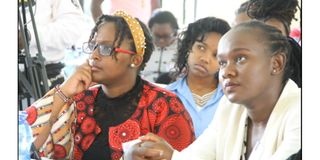Sanitary towels still inaccessible for most women, girls

A section of participants during the Nanyuki hygiene menstrual summit in Liakipia County on May 27, 2023. The summit heard that 65 per cent of women and girls countrywide have no access to sanitary pads.
What you need to know:
- As the world observed Menstrual Hygiene Day on Sunday, May 28, a menstrual hygiene summit, held the previous day in Nanyuki town, Laikipia County, heard that period poverty is still rampant in Kenya.
- Some 65 per cent of women and girls are unable to access or buy sanitary products, hence suffer in silence.
Lack of public awareness, cultural beliefs, climate change and high cost of living have been cited as major contributors to menstrual stigma.
As the world observed Menstrual Hygiene Day on Sunday, May 28, a menstrual hygiene summit, held the previous day in Nanyuki town, Laikipia County, heard that period poverty was still rampant in Kenya, with 65 per cent of women and adolescent girls unable to access or buy sanitary products.
Period poverty, according to Unicef, is a situation where girls and women cannot afford or have no access to period products, hence suffer in silence.
The annual Menstrual Hygiene Day provides a platform for stakeholders, including policymakers and the media, to forge a united voice in speaking for the rural women and girls and those in informal settlement areas who continue to suffer in silence, all this geared towards “making menstrual a normal fact of life by the year 2030”.
Ms Grace Wakahora, the wife of Laikipia Governor Joshua Irungu, was the chief guest at the Nanyuki Summit on Saturday. She announced the launch of a programme by her office to make menstrual health and products accessible and available in rural and urban areas.
Mrs Wakahora called on men to speak openly about menstruation and support the initiative, saying this is the only way to end the stigma that has seen thousands suffer in silence. Some communities consider it a taboo for men to discuss menstruation.

Ms Grace Wakahora, the wife of Laikipia Governor Joshua Irungu. She has launched a programme to make menstrual health and products accessible and available for girls and women in rural and urban areas.
Laikipia County Assembly Speaker Lanatano Nabaala regretted that his community considers it a taboo and even women can only whisper about it. “As leaders, we need to work together even if it means formulation of policies and laws that support menstrual hygiene among our daughters. In our community, this subject is still a taboo and no man can dare speak about it. It is now time to push for change to reduce suffering by girls, some of whom miss school lessons at that time of the month,” noted Mr Nabaala.
Bearing brunt
Assistant County Commissioner Kimberly Champagne said indigenous women and women living disabilities were the most affected by lack of access to sanitary hygiene products.
Ms Grace Wanene, the director of Drawing Dreams Initiative, a community-based organisation, termed it important to bring on board men in the menstrual hygiene campaign, noting that 72 per cent of boys lack awareness of reproductive health, hence an increase in period poverty.
Ms Wanene said inaccessibility of sanitary pads in arid and semi-arid lands counties exposes teenage girls to pregnancy, sexual and gender-based violence and risk of HIV/Aids infection.
But education officials warned against failing to give girls other necessary support, including inner wear.
“Recently, some girls who were set to join secondary school through a scholarship programme visited my office saying they had been given boxes of sanitary pads, but, unfortunately, they did not have panties. Please, do not only give sanitary towels to our girls, a panty is also a necessity when promoting menstrual hygiene,” said Ms Beatrice Wachira, a senior Ministry of Education official based in Laikipia.





